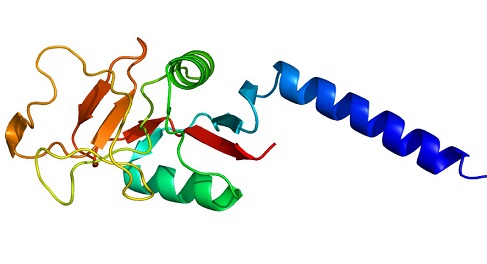COVID-19 News: Study Finds That Variants Of MBL2 Gene That Are Associated With High Mannose-Binding Lectin Levels Are Protective In COVID-19
Nikhil Prasad Fact checked by:Thailand Medical News Team Dec 18, 2023 1 year, 4 months, 3 days, 18 minutes ago
COVID-19 News: The global impact of COVID-19 caused by the SARS-CoV-2 virus has been unprecedented, with millions of cases and deaths reported worldwide. Despite significant progress in vaccination efforts, the emergence of viral variants continues to pose challenges, particularly in vulnerable and unvaccinated populations. One area of ongoing research is the exploration of genetic factors that may influence susceptibility to severe outcomes of COVID-19. A recent study covered in this
COVID-19 News report, conducted by researchers from the Universidade Federal do Vale do São Francisco (UNIVASF) in Brazil sheds light on the potential protective role of variants in the Mannose-binding Lectin 2 (MBL2) gene.
 MLB2 Gene
MLB2 Gene
Thailand
Medical News had previously covered studies showing that Mannose-Binding Lectin has antiviral effects against the SARS-CoV-2 virus.
https://www.thailandmedical.news/news/covid-19-antivirals-brazilian-study-reveals-mannose-binding-lectins-as-promising-antiviral-agents-against-sars-cov-2
Innate Immunity and Mannose-binding Lectin (MBL)
Innate immunity plays a pivotal role in the initial response to viral infections, including SARS-CoV-2. Mannose-binding lectin (MBL), a key component of innate immunity, is involved in pathogen recognition, complement system activation, and modulation of inflammatory responses. The MBL2 gene, located on chromosome 10, contains polymorphisms that significantly impact serum MBL levels. These polymorphisms influence MBL's ability to oligomerize and bind to pathogens, ultimately affecting complement system activation.
The Study Design
The UNIVASF study aimed to investigate the association between MBL2 polymorphisms and the risk of hospitalization and clinical worsening in COVID-19 patients. A cohort of 550 individuals, including 94 non-hospitalized and 456 hospitalized patients, was analyzed. Polymorphisms in MBL2 exon 1 and the promoter region were determined, and MBL and complement protein levels were measured.
Results and Associations
The study revealed that non-hospitalized patients exhibited a higher frequency of specific MBL2 genotypes and haplotypes associated with elevated MBL levels. Notably, critically ill patients carrying haplotypes linked to high MBL levels demonstrated protection against lower oxygen saturation, reduced use of invasive ventilation, and decreased incidence of shock. These associations remained significant after adjusting for potential confounders
.
A higher prevalence of the H/H genotype and the HYPA haplotype was observed among non-hospitalized individuals compared to their hospitalized counterparts. Furthermore, critically ill patients carrying haplotypes linked to elevated Mannose-binding Lectin (MBL) levels (HYPA/HYPA + HYPA/LYPA + HYPA/LYQA + LYPA/LYQA + LYPA/LYPA + LYQA/LYQA + LXPA/HYPA + LXPA/LYQA + LXPA/LYPA) demonstrated protection against various adverse outcomes. These outcomes included lower oxygen saturation levels (P = 0.02), reduced use of invasive ventilation (P = 0.02, OR 0.38), and a lower incidence of shock (P = 0.01, OR 0.40). Importantly, these protective associations remained significant even after adjusting for potential confounding factors through multivariate analysis.
Consequently, the study findings suggest that variants within the MBL2 gene, specifically those associated with higher MBL levels, may exert a protective influence on the clinical trajectory of COVID-19.
Implications and Comparisons with Previous Studies
The findings of this Brazilian study align with previous evidence from European populations, suggesting a protective role of MBL2 gene variants in severe COVID-19 outcomes. Notably, the study delved into the in-depth evaluation of various functional variants of MBL2, providing a comprehensive analysis through allelic, genotypic, and haplotypic assessments, along with the evaluation of plasma levels of MBL and complement proteins.
Discussion and Interpretation
COVID-19 severity is influenced by a myriad of factors, including age, comorbidities, viral variants, and host genetics. The study underscores the importance of innate immunity, particularly the role of MBL, in influencing the clinical course of COVID-19. MBL's ability to bind to SARS-CoV-2, inhibit infection, and activate the complement system may contribute to its protective effects. Variants associated with high MBL production seem to confer a protective advantage, particularly in critically ill patients.
However, the study acknowledges conflicting results from previous research, emphasizing the need to consider population-specific differences in MBL2 polymorphisms. Variability in the frequency of specific single nucleotide polymorphisms (SNPs) across populations may explain disparate findings in different studies. The study also points out the limitations, such as the lack of information on additional MBL2 gene polymorphisms and the absence of data on MBL levels in non-hospitalized patients.
Conclusion
In conclusion, the UNIVASF study contributes valuable insights into the role of MBL2 gene variants in shaping the clinical outcomes of COVID-19. The protective association observed in critically ill patients highlights the potential importance of MBL in mitigating severe complications. Further research, incorporating diverse populations and considering additional genetic factors, is crucial for a comprehensive understanding of the interplay between host genetics and COVID-19 outcomes. These findings may inform future strategies for identifying individuals at higher risk and tailoring clinical management for better outcomes in severe cases of COVID-19.
The study findings were published in the peer reviewed journal: Heliyon.
https://www.cell.com/heliyon/fulltext/S2405-8440(23)10878-4
For the latest
COVID-19 News, keep on logging to Thailand Medical News.
Read Also:
https://www.thailandmedical.news/news/scientists-discover-that-brain-fog-in-long-covid-is-due-to-disruption-of-mannan-binding-lectin-pathways-by-sars-cov-2-spike-proteins
